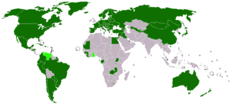
Back اتفاقية الأمم المتحدة بشأن عقود البيع الدولي للبضائع Arabic BMT-nin malların beynəlxalq alğı-satqısına dair müqavilələr haqqında Konvensiya Azerbaijani Конвенция за договорите за международна покупко-продажба на стоки Bulgarian Úmluva OSN o smlouvách o mezinárodní koupi zboží Czech De Forenede Nationers konvention om aftaler om internationale køb Danish UN-Kaufrecht German Convención de las Naciones Unidas sobre los Contratos de Compraventa Internacional de Mercaderías Spanish ÜRO konventsioon kaupade rahvusvahelise ostu-müügi lepingute kohta Estonian کنوانسیون سازمان ملل متحد برای قراردادهای فروش بینالمللی کالا Persian Convention des Nations unies sur les contrats de vente internationale de marchandises French
| United Nations Convention on Contracts for the International Sale of Goods | |
|---|---|
 ratified signed, but not ratified | |
| Type | multilateral uniform international sales treaty |
| Signed | 11 April 1980 |
| Location | Vienna, Austria |
| Effective | 1 January 1988 |
| Condition | 10 ratifications |
| Signatories | 18 |
| Parties | 97 |
| Depositary | The Secretary-General of the United Nations |
| Languages | Arabic, Chinese, English, French, Russian, and Spanish |
The United Nations Convention on Contracts for the International Sale of Goods (CISG), sometimes known as the Vienna Convention, is a multilateral treaty that establishes a uniform framework for international commerce.[1][Note 1] As of December 2023, it has been ratified by 97 countries, representing two-thirds of world trade.[2]
The CISG facilitates international trade by removing legal barriers among state parties (known as "Contracting States") and providing uniform rules that govern most aspects of a commercial transaction, such as contract formation, the means of delivery, parties' obligations, and remedies for breach of contract.[3] Unless expressly excluded by the contract,[4] the convention is automatically incorporated into the domestic laws of Contracting States and applies directly to a transaction of goods between their nationals.[5]
The CISG is rooted in two earlier international sales treaties first developed in 1930 by the International Institute for the Unification of Private Law (UNIDROIT).[6] When neither convention garnered widespread global support, the United Nations Commission on International Trade Law (UNCITRAL) drew from the existing texts to develop the CISG in 1968.[6] A draft document was submitted to the Conference on the International Sale of Goods held in Vienna, Austria in 1980.[7] Following weeks of negotiation and modification, the CISG was unanimously approved and opened for ratification; it came into force on 1 January 1988 following ratification by 11 countries.[8]
The CISG is considered one of the greatest achievements of UNCITRAL and the "most successful international document" in unified international sales law,[9][10] due to its parties representing "every geographical region, every stage of economic development and every major legal, social and economic system".[11] Of the uniform law conventions, the CISG has been described as having "the greatest influence on the law of worldwide trans-border commerce", including among nonmembers.[12] It is also the basis of the annual Willem C. Vis International Commercial Arbitration Moot, one of the largest and most prominent international moot court competitions in the world.
- ^ United Nations Convention on Contracts for the International Sale of Goods, Vienna, 11 April 1980, S.Treaty Document Number 98-9 (1984), UN Document Number A/CONF 97/19, 1489 UNTS 3. The full text of the CISG is available in pdf format at https://uncitral.un.org/sites/uncitral.un.org/files/media-documents/uncitral/en/a-conf-97-19-ocred-eng.pdf at 14 February 2022.
- ^ "United Nations Treaty Collection". treaties.un.org. Retrieved 2023-12-05.
- ^ United States Department of Commerce, 'The U.N. Convention on Contracts for the International Sale of Goods' "U.n. Convention on International Sale of Goods". Archived from the original on May 5, 2007. Retrieved April 2, 2007. at 22 December 2007.
- ^ Standard clauses in English and in German (opt-in/opt-out): See Verweyen, Foerster, Toufar Handbuch des Internationalen Warenkaufs UN-Kaufrecht (CISG) Archived 2017-07-08 at the Wayback Machine 2. Auflage, 2008 pg. 64 (in English and German)[failed verification]
- ^ This statement is only applicable for the US, The Czech Republic, and China, See Article 1,1B/95 Verweyen, Foerster, Toufar Handbuch des Internationalen Warenkaufs UN-Kaufrecht (CISG) Archived 2017-07-08 at the Wayback Machine 2. Auflage, 2008 pt. 21.2 pg 248 (in German)[failed verification]
- ^ a b "United Nations Convention on Contracts for the International Sale of Goods - Main Page". legal.un.org. Retrieved 2021-07-23.
- ^ "Legislative History: 1980 Vienna Diplomatic Conference". Institute of International Commercial Law. 2015-06-18. Retrieved 2020-11-29.
- ^ Argentina, China, Egypt, France, Hungary, Italy, Lesotho, Syria, the United States, Yugoslavia, and Zambia.
- ^ Joseph Lookofsky, 'Loose Ends and Contorts in International Sales: Problems in the Harmonization of Private Law Rules' (1991) 39 American Journal of Comparative Law 403.
- ^ Bruno Zeller, CISG and the Unification of International Trade Law (1st ed, 2007) 94.
- ^ John Felemegas, 'The United Nations Convention on Contracts for the International Sale of Goods: Article 7 and Uniform Interpretation (2000)' Pace Review of the Convention on Contracts for the International Sale of Goods (CISG) Archived 2018-09-15 at the Wayback Machine 115.
- ^ Peter Schlechtriem, 'Requirements of Application and Sphere of Applicability of the CISG' (2005) 36 Victoria University of Wellington Law Review 781.
Cite error: There are <ref group=Note> tags on this page, but the references will not show without a {{reflist|group=Note}} template (see the help page).
© MMXXIII Rich X Search. We shall prevail. All rights reserved. Rich X Search